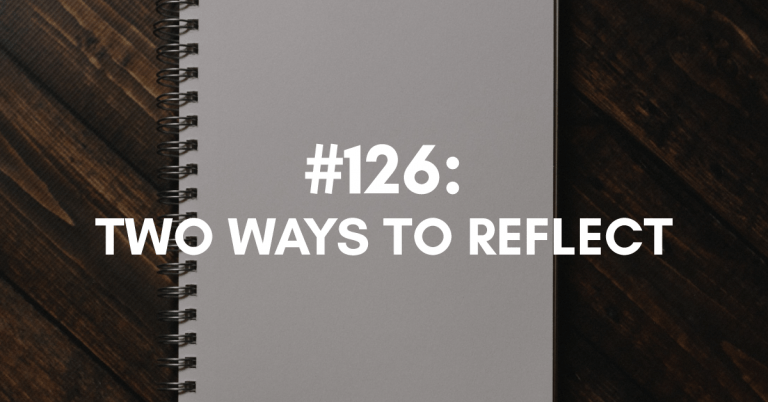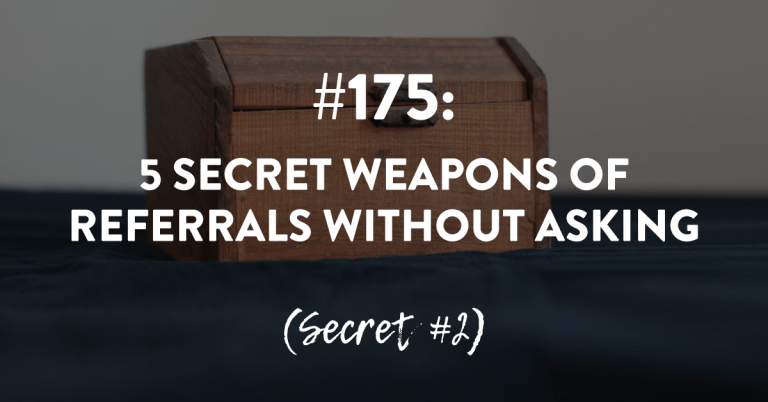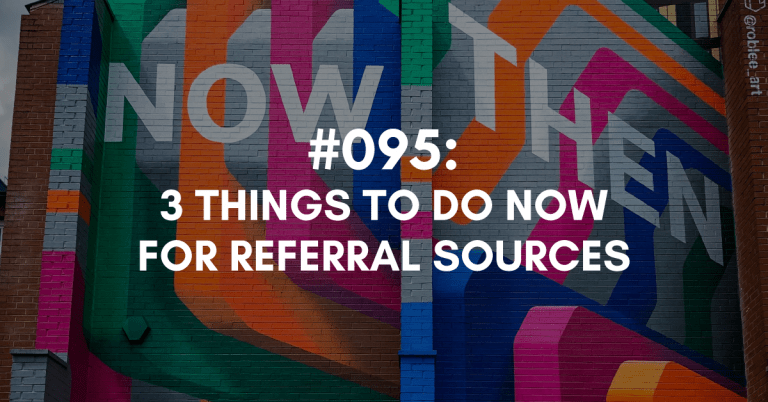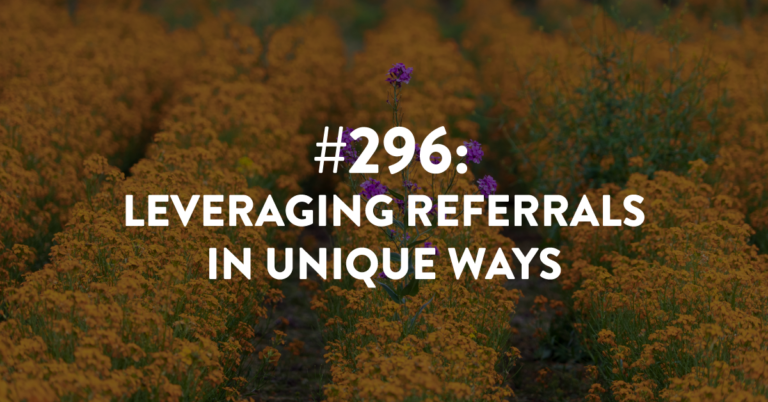Ep #254: A Peek Inside a Referable Business Part 3
Did you know that 9 out of 10 real estate agents are failing? In this episode, we’re diving into the world of real estate with a conversation about building a referable business in the industry. Our guest, Alex Mayer, is a successful real estate agent in Rochester, Minnesota, and in this episode, he shares his secrets to success and how he’s managed to build a business that generates referrals consistently.
Crediting his success to being coachable and putting systems in place, Alex reveals how he’s implemented these systems to save time on the back end, as well as the importance of having your ideal client avatar figured out. Even if you’re not a real estate agent, there’s valuable advice for anyone looking to build a business that generates referrals. Tune in to hear Alex’s approach and learn how you can start building your referable business one system at a time.
Links Mentioned During the Episode:
Is it time to get serious about joining Building a Referable Business™ (BRB)? First step is to submit your application BRB to see if you’re a fit.
Check out Alex Mayer on his website or his Facebook page.
Who Not How by Dan Sullivan and Ben Hardy
Next Episode:
Next episode is #255, and we have one more awesome business owner who is building a referrable business.
Download The Full Episode Transcript
Read the Transcript Below:
Stacey Brown Randall: If you are a real estate agent, you are definitely going to want to tune in to this episode. But even if you’re not a real estate agent, still tune in to hear this conversation about building a referable business one system at a time.
Hey there, and welcome to episode 254 of the Roadmap to Referrals Podcast, a show about helping you build a referrable business, I’m your host, Stacey Brown Randall.
Today, I am chatting with Alex Mayer, he was a real estate agent in Rochester, Minnesota. His company is Rochester Area Homes by Alex. And of course, I’ll put all the links of how to get in touch with Alex in the show notes page for this episode, staceybrownrandall.com/254. Alex is also a member of our coaching program, building a referable business.
For my real estate agents listening, here is a very hard truth: 9 out of 10 real estate agents are failing. I was shocked when Alex shared that statistic with me.
Alex credits his success so far — because he’s been in business for a while, but he’s got a long successful journey ahead of him. He credits his success to being coachable and putting systems in place.
When it came to his referrals, well, his approach was no different. He looked for someone (me) who could teach him the systems he needed to increase his referrals, let’s get to it.
Alex, I am so excited to have you on the podcast. I think it’s really interesting and important for people to hear from those who are actually going through the journey of building a referral business. So, I appreciate you taking time out of what I know is a very busy spring for you being a real estate agent.
So, before we dive in and talk about all the things referrals and you, why don’t you first tell us just a little bit about you? I mean, of course, I gave the typical bio when I introduced you as we were getting ready to come on for this interview. But tell our listeners just a little bit about yourself from your own words.
Alex Mayer: Well, my name is Alex Mayer like you said. I’m a real estate agent in Rochester, Minnesota. I’m an associated broker, I’ve been in real estate since 2016. In my market in 2022, I won best real estate agent for the city, runner up the year before. So, I do know what I’m talking about when it comes to real estate.
I’ve hired many real estate coaches over the course of the years. I noticed over the last two years that a significant portion of my clients actually came from referrals. I actually read Stacey’s book, I want to say two years ago for the first time. And it resonated with me because I’ve never been an agent who would really ask someone for referrals.
That was never really my policy. I really got into the habit early of asking people, or not asking people, but telling people that I appreciated having them and I wish I had a dozen more just like them. You call it planting referral seeds.
So, I’ve been pretty consistent with that, but I realized I didn’t actually have a system in place around that and since it was 30% of my business last year, that in order to really exponentially grow that, I needed to hire someone who is going to teach me how to create a system around that and a plan around it, and how to have those conversations.
And even in just the first two months that I’ve been with your program, I’ve actually seen a significant increase in people talking about me in referrals. And I’ve had just a lot more success around having conversations with people that are leading to them either mentioning me right away, keeping me more top of mind.
And ideally, I would like to just work with my referral clients because they are my ideal clients. And that was why I thought it was important to hire Stacey.
Stacey Brown Randall: I think that’s great. I remember the conversation that you and I had before you made the decision to join BRB. And I remember specifically you saying, “I am not afraid to hire people to teach me the things that I need to know.” And I’m like, “Oh my gosh, you’re like an ideal client.”
Like you want your clients to trust you as the expert when it comes to helping them buy or sell their home. And you recognize that that doesn’t make you the expert in everything else that you come across, you have to deal with as a business owner, and you recognize the value and the investment to make in getting the expertise that you need.
So, I remember hearing that and being like, “Oh, that is music to my ears.” It also told me (and I was right, I didn’t think I would be wrong) you’re probably going to be somebody who is going to jump in very quickly, have a very fast start because you’re used to consuming other people’s resources and expertise and advice and systems and strategies, and you just do, and that you have not disappointed me, Alex. So, I appreciate that as well.
I think that’s the benefit when you decide to make an investment, is to actually put it into practice, and then so we can start working for you. So, I think that’s awesome.
So, most people have an opinion about why referrals are so important to them, but just tell us a little bit about the real estate agent perspective of why referrals matter so much. Like what would it look like if you didn’t receive referrals in your business? So, why do they matter so much to you?
Alex Mayer: So, if you didn’t receive referrals, you’d be working what I would call the hamster wheel, which is if you are not out there prospecting and chasing business all the time, then your business is going to stall.
There’s several great benefits to a referral, but a couple short ones are these clients will already trust you out the gate, and they’re less likely to question your authority and your expertise if they know that someone has referred you to them. They’re going to trust you more.
Also, if you’re really trying to make a longevity business out of real estate, it’s really important that you have your ideal client avatar figured out. And if those ideal people are referring you the same clients, it’s going to lead to more clients. It’s going to lead to better conversations with those clients and more sales overall.
Also, with those new referred clients, you can turn them into, you call them alumni clients which I really like, I’ve been using that ever since. And those people will also refer you even more.
So, what ends up happening is you become the main agent in people’s friend groups or their work groups, whereas like, “Hey, I’ve worked with Alex, I’ve worked with Alex, I’ve worked with Alex too.”
I usually tell people if they’re talking to me for the first time, you probably will run into one or two people throughout the length of working with me who have either worked with me or have had conversations with me in the past.
But there’s several great benefits to referrals, but the most important one I would say is that these are your ideal clients. These are the people that you want to work with.
Stacey Brown Randall: And it’s that idea of that showing up and already trusting you, like it just moves the whole conversation forward quicker.
And that’s super valuable, particularly when you are a dime a dozen. And I mean, this is totally putting you on the spot here, but how many agents are in your area? Like how many real estate agents?
Alex Mayer: In my territory, there are 1,200 real estate agents and pretty consistent across the country, you will find that 13% of real estate agents are doing 65% of the business and 3% of agents are doing 40% of the business.
So, if you want to be a 3% agent, you really need to make sure that you’re differentiating yourself from the competition.
Stacey Brown Randall: Oh my gosh, it’s so true. I gave a presentation, guess it was last month at a real estate conference in Nashville. And that was one of the statistics I started with is —NAR came out with the fact that it’s something like, and I’m going to do this off the top of my head, which means probably my numbers won’t be 100% as they would’ve been if I had actually looked at what I said when I was giving my presentation.
But something about 80% of agents by June of last year, so in the first six months of the year — by June of last year, 80% (or maybe it’s even more than that) of agents had only sold like one or two or three … was less than four homes. And most of them, they may not actually do more than that in an entire year.
I remember looking at that statistic and I remember thinking when I was presenting to those agents, I’m like, “This should scare you. Like this should make you be like, huh, I don’t want to be in this category.”
Being an agent does make you a dime a dozen. It’s really no different from the financial advisors that I help or the attorneys that I help, or even the coaches and consultants that I help. Like we are never the only one. Very rarely are we the only one in what we do.
But if we are even in a more saturated market like real estate, I mean, there’s 1,200, in your area, the idea that that business would come from people doing the work for you, so to speak, by referring other clients to you, makes life so much easier and it makes it so much better to rise at the top of those in your area, those 1,200 agents. So, I think that’s awesome.
So, I believe that real estate agents, along with a couple of other industries, but I believe real estate agents is at the top of my list in terms of the industries where the people get beat over the head with this traditional old school advice about referrals: hey, you’ve got to ask or you’ve got to send out 1000 postcards with a sticker on it that says, “Don’t keep me a secret,” or you got to be promotional and gimmicky.
I feel like of all the industries I worked in, real estate, it’s at the top of the list. It’s like, this is how you have to do it, it has to be done this way. You must ask, you must be gimmicky, you must put this in your email signature. You must mail out these postcards. You must ask everybody you know, even your coffee barista every single morning if they know anybody.
So, it’s prevalent, and it permeates unfortunately in the real estate industry. Why for you … did you kind of like, whenever it was in your journey since 2016, be like, “Yeah, no, that’s just not how I’m going to do it.”
And what was that driving factor for you to kind of have you seek out something different that was vastly different from what your industry has been taught for decades?
Alex Mayer: Well, usually when I really analyze any traditional thing that we’re doing, if I see everybody else going left, I’m going to go right anyways because I want to send a message that’s different than what everybody else is sending. Like you said it feels icky to ask someone for a referral.
I’m really great when I talk to people about saying that I appreciate … if someone does refer me or they even just have a word-of-mouth conversation about me, I’m immediately thanking them and letting them know that I appreciate … I still call referral to them because I appreciate that they are talking about me in that element.
Also, I’m a big proponent, I will collect a lot of online reviews from my clients, and in those things, I will encourage them to remind people that it was a referral that came across to me. I’m also pretty consistent about letting people know that I am getting referrals.
Just two weeks ago, there’s a Facebook group in my territory, and every week or so, someone’s going to post on there that they’re looking for a realtor. Big mistake because you can throw a rock and hit a real estate agent.
So, I made a comment on there, I think I saw it within two minutes. I was like, I’m guessing over 200 comments in the first hour, poster ended up taking it down inside of like 20 minutes. But in the first 15 minutes, I had six people who mentioned my name.
Now, that’s word-of-mouth buzz, but I know it’s because those people were people that I have kept in contact with, and I reminded them that I am working by referral a good portion of time.
After having that happen, I actually made a post on my personal page about how thankful I was to have had six people refer me inside of the first 15 minutes, which is again, just circling it around in the people’s minds who maybe didn’t comment on those things, but that they know that I am getting referrals and that I’m a referable agent.
Stacey Brown Randall: I think it’s really important. A lot of times people, they overcomplicate the things that we need to be paying attention to and that we need to be doing so that people just kind of associate us with referrals, and I think you just gave some great suggestions there.
And in the way that makes it easy. And the way that’s like, “Hey, you don’t have to ask, and hey, you don’t have to mail out cards and tell people that they need to be referring you or not to keep you a secret, and that you can do these things in a way that feels good.”
And the reality of this is, I think about all the different strategies that we teach inside Building a Referral Business, inside BRB, the coaching program. And the truth is, of all the strategies we teach, not everybody uses all of them.
They use the ones that they need, that fits their personality, that fits who they are, that works best within their industry, and then what they just have capacity and sometimes just pure desire of which ones they want to do and which ones they don’t want to do, but none of them are overly complicated and none of them are hard to execute on.
Sometimes it’s just remembering, “Oh wait, I know the situational strategy to use in this situation and I’m going to use it,” and just keeping everything easy.
I think sometimes people, they either focus in on only one way to get referrals, and that’s just asking everyone they know, or they try to overcomplicate having — I hear a lot of people talk about, “I’ve got all these networking groups, I’m a part of all these networking rings that I have, and I have to sit in front of them like seven times a month.”
And I’m like you start multiplying that out, that sounds super complicated. It doesn’t have to be that way. So, of course, I’m glad that you think the way that we think, which is obviously one of the reasons why you’re in BRB.
So, you joined just a couple months ago, and when you completed your pre-work, we kind of were paying attention to the number of referrals that you average in a year. And so, we always hone in on that average, and for you, it was eight and some years it’s more, some years it’s less.
We’re looking over the last couple of years of data that we have, and then I think as you dug in more, there’s always that opportunity to figure out maybe what you missed, as you’ve kind of done that pre-work.
But then we set a goal for you for 24 referrals in your first year. What does that mean for your business if you were to get 24 referrals?
Now, let’s go with the expectation you won’t close them all and let’s be realistic. But when you think about what that kind of looks like, what would that mean for your business to have that many referrals for this year?
Hey, pardon the interruption. Want to join Alex inside the Building a Referable Business coaching program? Yes? Cool.
Then go to staceybrownrandall.com/referable to learn about everything you receive inside BRB and submit your application.
I love how Alex talks about being able to put the systems in place so that he can keep this going year after year after year, long after he’s done being a member of the BRB coaching program.
So, here’s what you got to do, first, complete an application. The link to do that and learn all about BRB is staceybrownrandall.com/referable.
What would that mean for your business to have that many referrals for this year?
Alex Mayer: Well, first it would mean an easier business because these are my ideal clients that I like to work with. They’re similar to the past clients and my ideal client avatar, so that makes it easier.
It will also lead to more future referrals as well, because if they are my ideal clients, they’re going to have a good experience and they’re going to refer even more.
From a revenue side, median sales price in my territory is 315 common commission, common. It’s 3% per site.
So, if you’re really averaging that out, it’s about $10,000 per sale. So, that’s a significant revenue. It also means that I’m going to be working with people who are going to probably close faster to a certain degree because they’re going to listen to me.
When you’re chasing someone or someone comes across as a lead, you have to prove to them that you know what you’re talking about and that you can get the job done. The average consumer will work with the first agent that they end up talking to.
So, just getting in front of them initially and having that social proof from someone that they know who’s either worked with me or someone who knows me or vice versa, they’re going to feel much more comfortable signing on with me and taking me as their agent.
Stacey Brown Randall: Let’s be honest, nothing really bad can come of receiving way more referrals this year in your visits, which is awesome.
So, two months in, this may be an unfair question to ask, but I’m going to ask you anyways: what’s kind of been an aha moment that you’ve had since joining BRB and starting to go through the different trainings and be a part of the group sessions? And just the time that you’ve spent so far inside BRB, what’s been an aha moment for you?
Alex Mayer: Well, there’s been a few. I think if I were to really nail it down to the most important one, I would say having a plan and putting time in my calendar to make sure that I’m executing on that plan.
So, I will go into my Google calendar (which I live and die by my calendar as a real estate agent) and I will put in there every Monday between 9.00 and 9.30, I will spend 30 minutes looking over how many referrals I’ve had, the conversations that I’m having, what my next step is in my annual plan, so I know what I’m going to be doing in June at this point.
We’re in March, and I know what I’m doing in June and I know what steps I have to do on a week-to-week basis to make sure that I’m moving each piece forward.
I think about when we did the St. Patrick’s Day thing, I had a plan every week for the five weeks up until that point. So, by the time that I was ready to send out those cards, I was already done.
And I already had that thing pasted out, instead of we have the conversation in real estate, the doctor says that an apple a day will keep me away, but that doesn’t mean have seven apples on Sunday.
That means that you need to make sure you’re consistent about it as you go throughout it. So, I think by having just that 30-minute period where maybe I’m not actually taking action, but I’m at least being mindful of what it is that I need to do that week to make sure that I’m moving things along in those areas.
So, usually, what I’ll do is I’ll look, hey, here’s my — we call them the revolving five. I do seven people that we’re trying to stay in touch with. And I reach out to them, I message them, I try to get meetings scheduled, whether it’s just a sit down or whatever.
I might order cards if there’s something specific that I’m doing later on down the road. But I’m making sure that I’m more mindful about what the next step is around those things.
And when you think about a 30-minutes a week is really not a long time to be investing into something like this, but by having that in my calendar that this is what I’m going to be doing at that time, I know that I’m going to be at least taking some action to make it happen.
Stacey Brown Randall: So, there’s probably some BRB members that are listening to this that could be like, “Oh, I should probably be a little bit more disciplined with that appointment on the calendar every single week.”
Not everybody, I would say in BRB is probably doing it that way, but I love how you’re being consistent with it. I mean, that’s a lot about how you run your business and how you look at things.
And within that little bit of time, as you said, you may not be taking action within that 30-minute block every Monday that you’re doing it, but you know that you’re paying attention to the two strategies you talked about, that you’re currently implementing on.
And as you start to add more, you’ll add more into that paying attention to them in that 30-minute block. And that is that you’ve got a plan for how you are working to generate more referrals from your existing referral sources.
So, that’s the Growth by Referrals, the GBR plan, that’s where you’re like, “Hey, I even know what I’m doing in June,” like you’ve got that all mapped out. And then you said so you’ve turned the running five into the running seven, which is perfect, we always say the number is irrelevant, you pick your number. We call it the running five just from having a name for it.
And you’re doing that, and that’s the strategy that comes out of referring machines, and that’s turning new people into referral sources. And so, having that time that you’re just like, “Hey, where am I? What do I need to be catching up on? What do I need to be paying attention to?”
I think that’s a beautiful use of your time, kind of getting the week started and it’s starting your week thinking about referrals, and then just following through in that as well. I think is great, I think it’s a good use of your time.
We may need to talk about that on a future weekly session with everybody in the group about creating, we’ll call it Alex time — creating their little 30-minute block of Alex time to make sure they’re paying attention to what’s coming.
I’m going to guess a lot of them do, do that, but I’m pretty sure probably not all of them do, awesome.
So, if there’s a real estate agent or business owner that’s listening right now and they’ve considered joining BRB and they’re trying to make the decision if they should or should not, what would you say to somebody that was considering joining or that you were referring to join BRB?
Alex Mayer: Well, as a real estate agent, you are a business owner, you are not a jack of all trades. And unfortunately, in real estate, we wear a lot of different hats from accountant to marketer, to many ways, a therapist. And we have to cover a lot of different areas.
In my experience, it’s always been in the agent’s interest to hire people who are better than them or have perfected a strategy so that you can implement and model your business after them. You may have heard of Dan Sullivan and Ben Hardy’s book, Who Not How.
I am a firm believer that if you find your who, the person who’s already done it, to either teach you how to do it or to do it for you, in this situation is to hire someone who can teach me how to do it — then you are going to be in a much better situation.
Because you are having the conversations with other BRB members and other people throughout the years, you’ve seen what works, you’ve seen what doesn’t work, so you have the advice and guidance to help us make better decisions.
So, when I hire someone or I’m paying someone … first off, I believe when you pay, you pay attention. When you’re getting free information, you don’t really give it the attention that it deserves.
When you pay, you’re going to be like, “Okay, if I’m putting this money into this, I’m going to make darn sure that I’m doing what this person tells me to do.” So, first off, you have also, as a real estate agent, you got to have a budget.
You have to have an expense sheet that you’re actually having in there. I say that is what makes us a business owner. If you were selling coffee at a coffee store, you would have coffee space, you would pay for coffee beans, you pay for the coffee machines, you have employees.
So, as a business owner, you need to hire someone who’s going to teach you to do things better. Now, in your situation, it’s referral. So, I do marketing, I have coaches in that area; mindset, I have coaches in that area.
And I believe that by hiring people who’ve already done it, or people who are having conversations and teaching people to do it better, you will be setting yourself up for much more success because you’re going to be able to borrow from them.
And then everyone’s going to wonder like, “How are you doing this? How are you getting all these referrals? Why is it that anytime I go online, it’s your name that comes up and people are looking for a real estate agent?”
And it’s not because I’m just sitting over here doing this on my own, it’s because I hire people who are experts in those fields to teach me how to do it. And I see it as an investment and I see that person as a coach, as a business expense that needs to be done in order to remain a top agent in my field.
Stacey Brown Randall: I think you dropped a lot of knowledge bombs there, like a lot of good things. I love that when you said when you pay, you pay attention, I think that is huge. And I think the fact that it’s like you should be open to learning, and getting the expertise from somebody who’s gone before.
So, we will link to the book you mentioned Who Not How in the show notes for anybody that’s like, “Wait, what was that book you said? So, we’ll link to that in the show notes for this episode as well.
But I also like the fact that when you’re talking through making an investment in something like this, you were really clear — and we actually ask this question when people are starting with us, it’s part of our onboarding process. When they’re booking their onboarding call, you may remember answering this question.
It’s like, “Hey, if you could only accomplish one thing when you joined BRB, what is your top priority?” And then there’s a caveat that says, “Don’t worry, we’re going to accomplish a whole bunch of things,” but I just want to hone your focus in on what’s the main thing, and for you, it was the system.
It was the system and the process of knowing how to do it. That’s how you run your business, that’s how you are so successful, and you knew exactly what you would take from this and ultimately, where it was going to fit in your business. And you knew for you it needed to be the system.
And it is the system for a lot of people, it’s not for everybody. But it is for a lot of people, and I think that’s important that you knew that, so that you could instantly get started and get off to a fast start, which is also super valuable.
Alright, we will definitely make sure as you are wrapping up your first year that we have a conversation back on the podcast, even if I’m just giving you a shout out to the results that I know you’re going to have, super excited to see how you do.
I appreciate you putting in the work because the advice is one thing, but it really means nothing if it just sits in your digital shelf. So, appreciate you putting in the work.
Is there anything I should have asked you that I didn’t, that you would want to share?
Alex Mayer: No, I guess if I was just to give my final thought, and you say this often; you got to make it about the referral source, they are the superhero in every situation.
It doesn’t matter if I get the client or I don’t get the client or they don’t reach out to me. Even in a word-of-mouth situation, I always make sure that they understand that it is them that I am thankful for.
I am happy and thrilled that they trust me enough to give my name, to refer me, to talk about me to their family members and friends. And that I always make sure that they understand they are the hero in the story.
Stacey Brown Randall: Thank you, Alex, for joining us on this episode. Here’s the thing, I know systems aren’t always the most fun thing to implement unless you’re like a process guru and then that’s your happy place.
But for most of us that aren’t systems and processes gurus, well, they take a lot of work and energy, and sometimes, we’re just more likely to procrastinate, putting in the systems that we know, we know in our gut, we know in our heart, we know in our mind that our business ultimately needs.
Why is it that when we know we need something, we still sometimes figure out a way to put it off. But here’s the thing you got to know about systems; anything that’s going to save you time on the back end will absolutely take your time on the front end to put into place.
So, my question for you is, if referrals are really important, what’s the first system you are going to put into place so you can start receiving more referrals this year just like Alex?
Every resource that we talked about will be linked on the show notes page. And you can find the show notes page at staceybrownrandall.com/254.
Next week is episode 255, and we have one more awesome business owner who we’re going to talk to, who is building a referable business.
Until then, you know what to do. Take control of your referrals and build a referable business. Bye for now.







